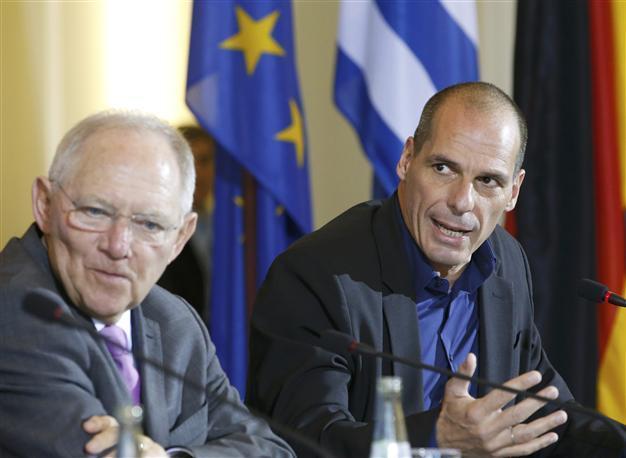Greece, eurozone in high-stakes debt stand-off
BRUSSELS - Agence France-Presse

Greek Finance Minister Yanis Varoufakis and German Finance Minister Wolfgang Schaeuble (L) address a news conference following talks at the finance ministry in Berlin February 5, 2015. REUTERS Photo.
Greece goes into talks with its eurozone partners on Feb. 16 demanding changes to a massive debt rescue programme which could ultimately force it out of the single currency bloc and into the unknown.German Finance Minister Wolfgang Schaeuble set an uncompromising tone for the 1400 GMT meeting when he accused Greece of being "irresponsible."
"From what I've heard from the technical discussions, I'm very sceptical" there will be an agreement, Schaeuble told German public radio.
"My guess is that it's all a big game of poker for this new government," he said, adding that it was up to Greece to decide if it wanted to remain in the eurozone.
At the height of the debt crisis in 2011-12 it seemed possible that Greece would collapse, taking the eurozone with it.
But analysts say this is much less likely now because of changes made to strengthen the single currency's defences but it remains a concern and markets are watching Monday's talks very closely.
Brussels favours a straight rollover of the current Greek programme which ends this month but new hard-left Greek Prime Minister Alexis Tsipras won office last month on a promise to ditch it outright for damaging Greece, not helping it.
Another option would be some sort of deal to cover Greece's short-term finance needs until it can get the economy growing fast enough to cope with a crippling debt burden, analysts say.
"We don't need money, we need time to realise our reform plans," Tsipras told German news weekly Stern on Sunday.
But time is pressing, with European Commission head Jean-Claude Juncker "making a last effort in an extremely difficult situation" in a phone call with Tispras Sunday, an EU official said.
The problem is to find wording that satisfies all sides after an informal Eurogroup finance ministers meeting on Wednesday ended acrimoniously.
"The failure of the Eurogroup last week to agree even on steps for further discussions on Greece does not bode well for the emergence of a full solution at Monday's meeting," Capital Economics said in a research note.
The European Union and the International Monetary Fund rescued Greece in 2010 and again in 2012 at a cost of some 240 billion euros ($273 billion), plus a hugely controversial private sector debt write-down worth more than 100 billion euros.
In return, Athens agreed to a series of stinging austerity measures and much-resented oversight by the EU, IMF and ECB 'troika' to make sure it stuck to the bailout terms.
The deal kept Greece in the eurozone but it also left Athens with a debt mountain of 315 billion euros, about 1.75 times the size of its economy.
Athens says this burden must be eased to give it the leeway to help an economy which only returned to growth in 2014 after years in recession and has recently shown fresh signs of weakness.
"Even if a plan is agreed, it is likely only to tackle Greece's near-term financing requirements and hence kick the can down the road," Capital Economics said.
"Finding a lasting solution to Greece's debt burden that would guarantee its future inside the currency union (eurozone) will be a much bigger challenge."
To get a deal Tsipras must come to terms with German Chancellor Angela Merkel, who believes fiscal discipline is the only true basis for sustainable economic growth, not borrowing and public excess.
A first meeting at an EU leaders summit on Thursday went better than expected, with Merkel recognising the need for compromise in response to Tsipras's apparent willingness to be flexible, accepting 70 percent of the current programme while dropping the remainder.
At the same, the chancellor also called for Greece to respect all the bailout conditions.
"Time and money are running out for Greece," Holger Schmieding of Berenberg Bank said in a research note Monday.
"A subtle change in tone in Athens suggests that the new Greek government has started to notice.
"But whether Tsipras has really grasped how close he has already pushed Greece to the abyss of wholesale financial crisis, recession and Grexit and whether he is ready to perform the inevitable U-turn to avoid that fate remains a very open question."
















